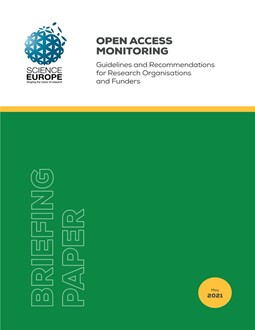
Open Access
Open Access is the principle and practice of providing free online access to scholarly publications. Science Europe promotes Open Access to research publications as part of its commitment to support Open Science as part of a well-functioning research system.
Why does Open Access matter?
Open Access is the practice of granting access to scholarly outputs (including, but not limited to publications) to anyone without any costs or other barriers and restrictions, including to most forms of use and re-use by humans and machines.
Science Europe believes that Open Access to research publications, as defined in the ‘Berlin Declaration on Open Access to Knowledge in the Sciences and Humanities’, improves the pace, efficiency, and efficacy of research, and heightens the authors’ visibility, and thus the potential impact of their work. By removing structural and geographical barriers that hinder the free circulation of knowledge, it contributes to increased collaboration, ultimately strengthening scientific quality and capacity.
Moving to a system of Open Access that enables re-use and computational analysis of published material, opens up new possibilities for researchers to access information, and improve knowledge transfer for society, policy, and the economy.
It is also crucial to increase the impact of publications and the cost efficiency of the publication system. This sparks innovation and facilitate interdisciplinary research, as well as scholarly exchange on a global scale, for the benefit of not only the research community, but also the economy and society as a whole.
What are the current priorities?
Science Europe and its research funding and performing member organisations are key players in accomplishing a smooth and rapid transition to Open Access. This transition must take place in an efficient and sustainable way, avoiding unnecessary costs. It also requires strong engagement of the research community, in order to adapt the system to a culture of sharing. Defining new models to replace the current subscription system, elaborating guidelines adapted to the different forms of research publications, revising research evaluation mechanisms, raising awareness as well as addressing possible impacts to other aspects of the research process are among the priorities of Science Europe and its members.

What is Science Europe doing to achieve these aims?
Science Europe is working with its member organisations, the broader research community, and European and national policymakers to elaborate the best possible solutions to practical aspects of the transition and implementation of full Open Access policies, adapted to different contexts.
In 2013, Science Europe member organisations unanimously endorsed and committed to a set of common principles on the transition to Open Access to research publications. Today, as a result, an overwhelming majority of our members have implemented Open Access policies or are actively developing them. Today, our members share the most advanced Open Access policies in the world.
Science Europe member organisations are also driving forces behind numerous other organisations, initiatives, and movements promoting Open Access with concrete actions. These notably including cOAlition S and its work on full and immediate Open Access centred on Plan S and the OA2020 initiative.
In 2021, Science Europe published a briefing paper on Open Access monitoring to support decisionmakers at research funding and performing organisations to improve existing processes and develop new monitoring exercises. The availability of data and information on the current state of scholarly publishing is invaluable to help advance Open Access, including to inform policy development, implementation, and evaluation.
Briefing Paper on Open Access Monitoring
This briefing paper aims to support decision makers at research organisations and research funders to develop new monitoring exercises or assess and improve existing processes to measure the Open Access status of publications.
Diamond Open Access
Diamond Open Access refers to a scholarly publication model in which journals and platforms do not charge fees to either authors or readers. They are community-driven, academic-led, and academic-owned publishing initiatives, which typically serve a fine-grained variety of generally small-scale, multilingual, and multicultural scholarly communities. Diamond Open Access journals and platforms are equitable by nature and design and embody the concept of bibliodiversity.
Science Europe is one of the leading organisations working to strengthen Diamond Open Access in scholarly publishing. This is part of our commitment to support Open Science as part of a well-functioning research system. A collaborative process started in 2020 and continues to engage a growing number of partners.

